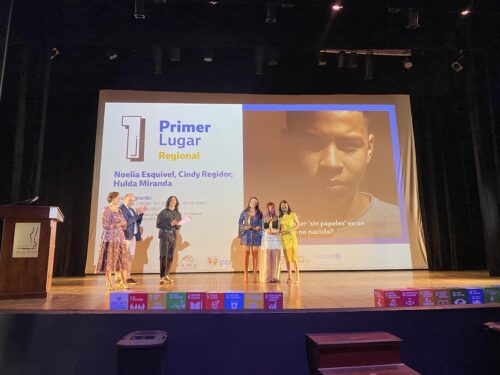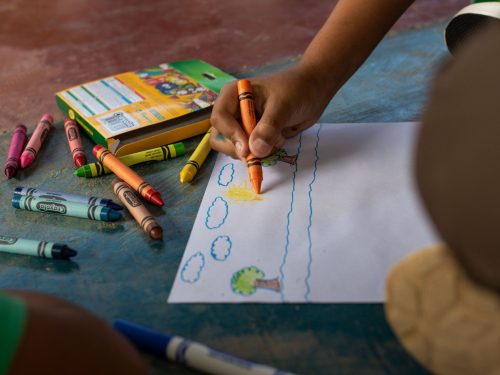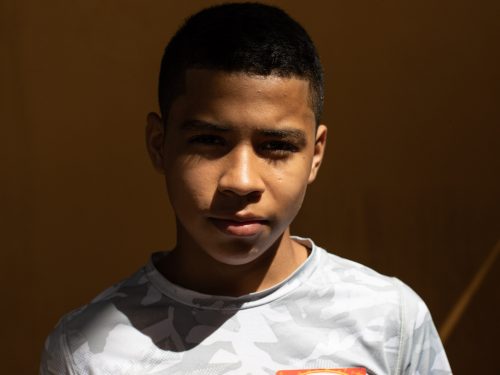
Pamela López Meléndez lifts the mattress and pulls out a folder full of sheet music. She sleeps in this hot room without windows with her older brother Christopher and rehearses, on her feet, the melodies that they learn together in class.
The violins they use for practice were lent to them by the National Music Education System (Sinem) in Liberia a year-and-a-half ago when they proved they were good enough to practice at their home in barrio El Capulín. Their parents Gilma Meléndez and Cristian López couldn’t possibly afford to pay ¢97,000 ($160) for each instrument.

The 42 children of the Sinem’s Bistro String Orchestra hold their final rehearsal of the year on December 4 in the Guanacaste Museum.Photo: César Arroyo
El Capulín is an urban neighborhood near downtown Liberia. Its main street is losing its surface as homes become poorer. A hundred meters beyond where the pavement ends is the house that Gilma and Cristian rent.
The gravel runs under the gate and onto the porch of the house, where mats and armchairs rest and clothes hang. On a December afternoon, Pamela sits on one of the dusty chairs in the hallway and discusses music with enthusiasm.
There is no trace of the girl she was two years ago, when she lowered her glance and hid her hands upon speaking. “It’s incredible what Sinem has done for these kids,” Gilma says in a gentle voice.

Milagro holds the sheet music for her sister Pamela while she practices at home with the violin that Sinem lent her.Photo: César Arroyo
Before studying violin, the family lived in another precarious neighborhood where Pamela was bullied. The other children only let her be part of their group if she let them hit her, so Gilma told Cristian, “we grew up in this violent environment and it’s not necessary for our children to live here too.”
So they left the house they had and rented a home somewhere else where the children met other people. They also enrolled them in Sinem, where Pamela got over her depression and low self-esteem thanks to the violin, new friends and plans that keep her motivated.
“When I become a violin teacher, I am going to be very happy and proud, above all because of those who supported me,” says Pamela, who longs to play a solo piece in front of a large crowd in Mexico because “they say it’s a big and beautiful place.”

Pamela walks toward backstage in order to meet up with her friends. In a few hours, they will give their last concert of the year in the GuanacasteArte Fair in Cañas.Photo: César Arroyo
Sitting in a chair in front of her, Christopher searches in his cell phone for ‘Born Ready’ by Dove Cameron, his favorite song. He used to spend hours playing with his phone. Now he dedicates that time to finding music that he wants to learn to play.
He’s only 12 years old, but sometimes he says things to his mom like, “if you can’t pay for college, I know that I’ll be able to by giving violin classes.” His ideas seem mature.
Not everything in life is easy, but the rewards are great,
he says, reflecting on the time he failed the exam for joining professor Pablo’s band.
His role model is that very professor who once told him no, but after a second try told him yes: Professor Pablo Vega, who was also a Sinem student and directs the band Bistro, which is made up of 42 kids, including Christopher and Pamela.

The Bistro String Orchestra played pieces like The Ballad of the Snail, The Ballad of Big Ben, Water Music and The Elephant.Photo: César Arroyo
A Change of Scores
When the sun goes down, Gilma and a neighbour move Cristian, the children’s’ father, to a mat on the gravel patio in the shade where he takes his afternoon naps.
Six months ago, Cristian was leaving work at Hacienda Pinilla. It was 5:30 p.m. and it was raining hard. As he always did, he got on his motorbike – the motorbike that his wife is so afraid of – and he went home. A truck was racing down the Santa Cruz highway and hit a horse. After impact, the horse fell into the lane where Cristian was driving his bike.
“Cristian didn’t see it. That’s what his colleagues told me. I hope he remembers and can tell me when he is able to speak,” says Gilma. The accident paralyzed half his body and left him unable to speak.
Recovery has been slow. She left her job as head of the baby room at a daycare center in order to help speed her husband’s recovery. Now they only have insurance money in order to cover all their expenses.

Gilma Meléndez watches her childrens’s last concert from the crowd. They are playing all the pieces they have learned this year.Photo: César Arroyo
The shortage of money might force them to return to the house they had in the neighborhood where they used to live where Pamela was bullied. What isn’t in their plans is pulling the kids out of Sinem. They will try to earn a scholarship this year that exempts them from paying ¢10,000 ($16) in enrollment and monthly tuition. The program accepts children from all backgrounds, so some parents subsidize the costs of those who can’t afford to pay.
With the violin tuned, Christopher crosses the porch full of wet clothes to the mat where Cristian is resting. “Music allows me to express my feelings,” he says in the voice of someone more mature than his age. He sits on the mat and plays the violin until his dad falls asleep.







Comments